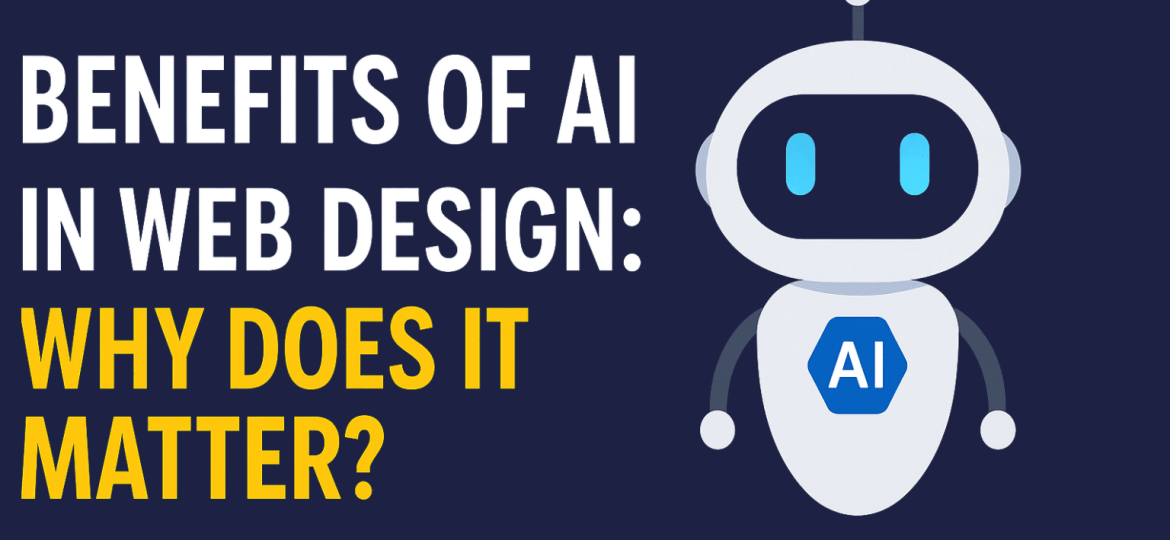
In today’s digital-first world, a compelling website is no longer a luxury—it’s a necessity. Whether you’re a startup, a freelancer, or a well-established brand, your website acts as your online storefront. With the increasing demand for fast, user-centric, and responsive web experiences, Artificial Intelligence (AI) has emerged as a transformative force in web design. But why does it matter so much? Let’s dive into the benefits of AI in web design and why you should care.
1. Faster Design and Development
AI-powered tools can significantly speed up the website design process. Platforms like Wix ADI and Bookmark’s AIDA use AI to generate customized websites in minutes, based on user input and preferences. This eliminates the need for repetitive manual work and allows developers and designers to focus on creative and strategic aspects.
Why it matters:
Speed to market is crucial in today’s competitive landscape. AI helps you launch faster and iterate quicker.
2. Personalized User Experiences
AI collects and analyzes user data in real time, allowing websites to deliver highly personalized experiences. From recommending products to displaying dynamic content based on user behavior, AI makes websites smarter and more engaging.
Why it matters:
Personalization boosts user satisfaction, increases engagement, and ultimately drives conversions.
3. Enhanced UX/UI Design
AI can analyze heatmaps, click-through rates, scroll behaviors, and more to suggest UI/UX improvements. It can also generate A/B test variants, automatically select winning versions, and optimize layout elements for usability and performance.
Why it matters:
User experience can make or break your website. AI-driven insights ensure your design decisions are backed by data, not guesswork.
4. Smarter Content Generation
AI writing tools like ChatGPT and Jasper can assist in generating website copy, blog posts, and product descriptions that align with SEO and branding guidelines. AI can also auto-translate content to multiple languages for global reach.
Why it matters:
Great content drives traffic. AI ensures you always have fresh, optimized content to attract and retain visitors.
5. Voice and Visual Search Integration
Modern web design must consider how people interact with the internet. AI enables voice search and image recognition capabilities, allowing users to search using their voice or photos, which is essential for eCommerce and accessibility.
Why it matters:
User expectations are evolving. Staying ahead with modern AI features keeps your website relevant.
6. Automated Customer Support
Chatbots powered by AI offer 24/7 customer assistance, guiding users through the website, answering FAQs, and solving basic issues without human intervention. Tools like Drift and Tidio make this integration seamless.
Why it matters:
Improved customer support enhances user trust and reduces bounce rates.
7. Better SEO Optimization
AI tools like Surfer SEO, MarketMuse, and Clearscope analyze keyword performance, competitor pages, and search trends to help optimize your site for better rankings. They can suggest meta tags, internal links, and content improvements.
Why it matters:
Without visibility, even the most beautiful website is invisible. AI keeps your site competitive on search engines.
8. Cost Efficiency
By automating various aspects of design, development, testing, and optimization, AI can significantly reduce the cost and time involved in building and maintaining a website.
Why it matters:
Lower costs mean more budget for marketing, growth, and innovation.
9. Predictive Analytics and Decision Making
AI analyzes past user behavior and website metrics to predict future trends and user actions. This allows businesses to make data-driven decisions on design updates, content strategy, and marketing efforts.
Why it matters:
Informed decisions lead to better business outcomes.
Final Thoughts
AI in web design isn’t just a buzzword—it’s a strategic advantage. It enables businesses to build smarter, faster, and more user-centric websites that deliver real results. As AI continues to evolve, its role in web design will only grow more critical.
If you’re not already leveraging AI in your web design process, now is the time to start. Your competitors likely are.

